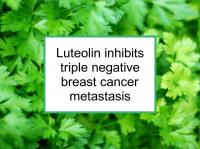Luteolin, a yellow vegetable pigment, has been linked to reduced breast cancer risk. The most abundant food sources of luteolin are celery seed, Mexican oregano (Lippia graveolens), thyme and radicchio. Significant levels of luteolin are also found in parsley, as well as some other culinary herbs.
Luteolin has been shown to induce programmed cell death (apoptosis) in breast cancer cells, as well as inhibiting angiogenesis (new blood vessel formation), the production of estrogen by ovarian cells, and aromatase activity (in which androgens are converted to estrogens). Now a new study has reported that luteolin inhibits metastasis of triple negative (ER-/PR-/HER2-) breast cancer in cell and animal studies.
Anti-breast cancer effects of luteolin
Numerous studies have reported that luteolin induces apoptosis in various types of cancer cells, including breast cancer. As noted above, luteolin has also been shown to inhibit angiogenesis and aromatase activity in the laboratory. Italian population studies have reported that high dietary intake of flavones such as luteolin is associated with lower risk of breast cancer.
In addition, luteolin has been shown to induce apoptosis and reduce proliferation in multidrug resistant hormone receptor positive (ER+/PR+) breast cancer cells. In fact, luteolin has been shown increase the anti-cancer effects of the chemotherapy drugs doxorubicin and paclitaxel. Luteolin has also been found to inhibit estrogen biosynthesis by reducing aromatase activity. However, luteolin should not be taken as a supplement because, paradoxically, it can also have estrogenic effects, depending in part on the dosage.
Latest research finds luteolin suppresses TN metastasis
The study referenced at the beginning of this news story was designed to investigate the mechanism of action by which luteolin inhibits the metastasis of triple negative breast cancer. To conduct the study, the authors examined the effects of luteolin in highly metastatic triple negative breast cancer cells and in an animal xenograft breast cancer model. Pretreatment of the triple negative breast cancer cells with luteolin was found to inhibit cell migration and invasion in a dose‑dependent manner, reversing epithelial-mesenchymal transition (EMT). EMT is a crucial event in the tumor invasion process, enabling an epithelial cell to acquire enhanced migratory capacity and invasiveness, as well as increased resistance to apoptosis.
Luteolin also markedly inhibited lung metastases of breast cancer in the xenograft model. The expression of various EMT-related molecules in primary tumor tissues were found to be reduced in primary tumor tissues. Notably, luteolin also suppressed the expression of β-catenin mRNA and protein in both the cell and animal studies. β-catenin is one of the key components of the Wnt signaling pathway. The Wnt signaling pathway sends β-catenin into the cell nucleus to activate the EMT cell transitions that cancer cells undergo in the process of becoming capable of metastasis. Inhibition of β-catenin signaling also appears to play a central role in the anticancer activity of certain other micronutrients.
The authors conclude that luteolin effectively suppressed metastases of breast cancer by reversing EMT, which appears to be mediated by downregulation of β-catenin.
Please see our article on what women with triple negative disease should eat for more information.
